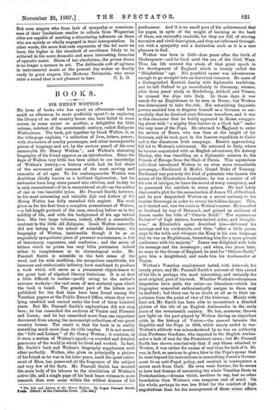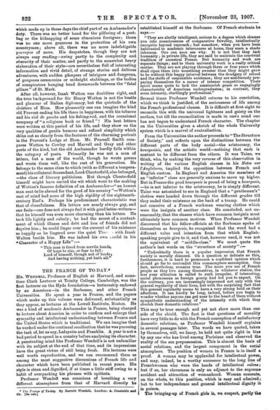BOOKS.
SIR HENRY WOTTON.*
No lover of books who has spent an afternoon—and how could an afternoon be more profitably spent P—in exploring the library of an old country house can have failed to come across, in some corner or another, a delightful fat little volume, redolent of the seventeenth century, called Reliquiae Wottonianae. The book, put together by Izaak Walton, is, as the title-page explains, "a collection of lives, letters, poems ; with characters of sundry personages, and other incomparable pieces of language and art, by the curious pencil of the ever memorable Sir Henry Wotton " ; and Walton's charming biography of his friend appears as an introduction. Since the days of Walton very little has been added to our knowledge of Wotton's history,—a history which had its full share of the movement and romance of the most moving and romantic of all ages. To his contemporaries Wotton was doubtless chiefly known as a brilliant diplomatist; but his embassies have long since passed into oblivion, and to-day lie is only remembered—if he is remembered at all—as the author of one or two beautiful lyrics. Mr. Pearsall Smith, however, in his most interesting and valuable Life and Letters of Sir Henry Wotton has fully remedied this neglect. His work gives us for the first time a complete presentment of Wotton, —a full-length portrait of the man, standing before us in the solidity of life, and with the backgrouud of his age behind him. His two large volumes, indeed, afford a remarkable contrast to the little old Reliquiae. Izaak Walton assuredly did not belong to the school of scientific historians; his biography of Wotton, inestimable though it be as an exquisitely sympathetic piece of personal reminiscence, is full of inaccuracy, vagueness, and confusion ; and the series of letters which he prints has very little pretension indeed either to completeness or to chronological order. Mr. Pearsall Smith is scientific in the best sense of the word, and his wide erudition, his scrupulous exactitude, his immense and enthusiastic industry, have combined to produce a work which will serve as a permanent object-lesson to the great host of slipshod literary historians. It is at first a little difficult to realise—partly owing to the author's extreme modesty—the vast mass of new material upon which the book is based. The greater part of the letters now published for the first time have been found among the Venetian papers at the Public Record Office, where they were lying unedited and unread under the dust of three hundred years. But Mr. Pearsall Smith's explorations did not stop here ; be has ransacked the archives of Venice and Florence and Lucca ; and he has unearthed more than one important document from among the manuscript collections of our great country houses. The result is that his book is in reality something much more than its title implies. It is not merely the "Life and Letters" of Sir Henry Wotton; it contains, as it were, a section of Wotton's epocb,—a crowded and detailed panorama of the world in which he lived and worked. In fact, Mr. Smith's book and Walton's biography supplement each other perfectly. Walton, who gives us principally a picture of his friend as he was in his later years, amid the quiet retire- ment of Eton, has preserved all the fragrance of the subject and very few of the facts. Mr. Pearsall Smith has devoted the main body of his labours to the elucidation of Wotton's active life, and a single page of his book bears witness to more research than ever came within the wildest dreams of his • The Life and Letters of Sir Henry Wettest. By Logan Pearsall Smith. !vets. Oxford: at She Clarendon Press. [15s. net.] predecessor. And it is no small part of his achievement that his pages, in spite of the weight of learning at the back of them, are eminently readable, for they are full of stirring narrative and vivid description, and they are informed through- out with a sympathy and a distinction such as it is a rare pleasure to find.
Wotton was born in 1568—four years after the birth of Shakespeare—and he lived until the eve of the Civil Ware. Thus his life covered the whole of that great epoch in the development of England which is loosely called the "Elizabethan" age. His youthful career was adventurous enough to go straight into an historical romance. He came of a distinguished Kentish family with diplomatic traditions, and he left Oxford to go immediately to Germany, whence, after three years' study in Heidelberg, Altdorf, and Vienna, he crossed the Alps into Italy. In those days it was unsafe for an Englishman to be seen in Rome ; but Wotton was determined to take the risk. His astonishing linguistic powers enabled him to disguise himself as a German so- suc- cessfully that be deceived even German travellers, and it- was in this character that he boldly appeared in Rome, swagger- ing about with "a mighty blue feather in a black hat" under the very nose of the Pope. He returned to England to enter the service of Essex, who was then at the height of his fortunes, and he took part in the famous expedition to Cadiz and in the disastrous Irish campaign. Essex's approaching fall led to Wotton's retirement. He returned to Italy, where he became acquainted with an English adventurer, Sir Antony Sherley, who was travelling on a diplomatic mission to the Princes of Europe from the Shah of Persia. This mysterious individual introduced Wotton to an even more remarkable personage,—Ferdinand di Medici, Grand Duke of Tuscany. Ferdinand was precisely the kind of potentate who haunts the scenes of the Elizabethan dramatists; he was a master of all the arts of intrigue, he knew the secret of every conspiracy, and he possessed the antidote to every poison. He had lately discovered a plot for the assassination of James VI. of Scotland, and he now despatched Wotton on a secret embassy to his brother Sovereign in order to reveal the hidden danger. This, as it turned out, was the crisis in Wotton's career. He travelled to Scotland by way of Denmark, and gained an audience of James under the title of "Ottavio Baldi." The mysterious Italian—" of high stature, brown-haired, sober, and thonght- wise," as Elizabeth's agent described him—delivered his message and his credentials, and then, "after a little pause, steps to the table and whispers the King in his own language that he was an Englishman, beseeching him for a more private conference with his majesty." James was delighted with both the message and the messenger; and when, two years later, he came to the throne of England, he sent for " Ottavio Baldi," gave him a. knighthood, and made him his Ambassador at Venice.
Wotton's Venetian employment lasted, with intervals, for twenty years, and Mr. Pearsall Smith's account of this period of his life is perhaps the most interesting, and certainly the most original, part of his book. Whether Wotton's voluminous despatches have quite the value—as literature—which his biographer somewhat enthusiastically assigns to them may be doubted ; but there can be no doubt at all as to their im- portance from the point of view of the historian. Mainly with their aid, Mr. Smith has been able to reconstruct a detailed picture of the life of an English Ambassador in the early years of the seventeenth century. He has, moreover, thrown new light on the part played by Wotton during an important crisis in the history of Venice,—the quarrel between the Republic and the Pope in 1606, which nearly ended in war. Wotton'e attitude was misunderstood by no less an authority than Professor Gardiner, who imputed to the English Ambas- sador a lack of zeal for the Protestant cause ; but Mr. Pearsall Smith has shown conclusively that if any blame attached to Wotton, it was rather for excess of zeal than for lack of it. He was, in fact, so anxious to give a blow to the Pope's power that he went beyond his instructions in committing James's Govern- ment to an anti-Papal policy, and received in consequence a severe snub from Cecil. He even went further, for he seems to have had dreams of converting the whole Venetian State to Protestantism,—dreams which, needless to say, had no other foundation than Wotton's own sanguine cast of mind. On the whole, perhaps he was less fitted for the conduct of- high negotiations' than for the management of those minor affairs
which made up in those days the chief part of an Ambassador's duty. There was no better hand for the pilfering of a post- bag or the kidnapping of some obnoxious foreigner; there was no one more generous in the protection of his own countrymen ; above all, there was no more indefatigable purveyor of news. His despatches, though they are not always easy reading—owing partly to the complexity and obscurity of their matter, and partly to the somewhat heavy elaboration of their style—are- nevertheless full of interesting information and vivid detail, of strange stories and dubious adventures, with sudden glimpses of intrigues and dungeons, of gorgeous ceremonies or midnight stabbings, or the bodies of conspirators hanging head downwards between the "fatal pillars " of St. Mark.
After all, however, Izaak Walton was doubtless right, and the true background for Sir Henry Wotton is not the bustle and glamour of Italian diplomacy, but the quietude of the cloisters of Eton. How pleasantly one can imagine the kind
old Provost ending his life there in happiness, with his tobacco and his viol de ganiba and his fishing-rod, and the occasional
company of " a religious book or friend " ! His best letters were written at this period of his life, and they show us the very qualities of gentle humour and refined simplicity which shine out so clearly from the features of the charming portrait in the Provost's Lodge at Eton. Mr. Pearsall Smith com- pares Wotton to Cowley and Marvell and Gray and other poets of the kind, but the old Ambassador hardly falls within the category of poets. Primarily he was not a man of letters, but a man of the world, though he wrote poems and wrote them well, like the rest of his generation. He belongs to the same class to which (with so different a tempera- ment) his collateral descendant, Lord Chesterfield, also belonged, —the class of literary politicians. But though Chesterfield himself might have envied the wit which went to the making of Wotton's famous definition of an Ambassador—" an honest man sent to lie abroad for the good of his country "—Wotton's east of mind had none of the high rigidity of the eighteenth- century Earl's. Perhaps his predominant characteristic was that of cheerfulness. His letters are nearly always gay, and one feels—one does not always feel it with good letter-writers- that he himself was even more charming than his letters. He took life lightly and calmly ; he had the secret of a content- ment of which illness and debt and loss of friends did not deprive him ; he could linger over the current of his existence as happily as he lingered over the quiet Thar with Izaak Walton beside him. He was indeed his own Liodel in his "Character of a Happy Life" :—
" This man is freed from servile hands, Of hope to rise, or fear to fall :
Lord of himself, though not of lands ; And having nothing, yet hath all."



















































 Previous page
Previous page